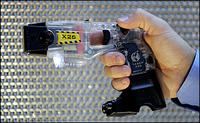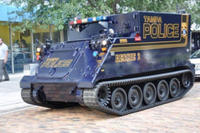-
Reduced prices for license plates readers attracts more buyers
Now that the cost of Automatic License Plate Readers (ALPR) has dropped $17,000 from its initial price of $24,000, these devices are becoming increasingly common with more and more police departments across the country purchasing them
-
-
Also noted
Minn. police give body cams a tryout | Law enforcement technology aims to step up policing |New Jersey paves the way for stun gun deployment | Tomorrow’s law enforcement technology today | 18th century wisdom guides Supreme Court’s GPS ruling | Technology helps police become more efficient | Smart911 sees rapid growth in 2011
-
-
Spike in violent incidents in hospitals

Over the past decade, hospitals across the nation have been subject to an alarming increase in violent incidents; in the last five years alone, there has been nearly a 300 percent increase in the number of reported homicides, assaults, and rapes compared to the previous five years
-
-
Police chiefs at White House to discuss domestic radicalization
Law enforcement officials from state and local agencies across the United States gathered on Wednesday at the White House to discuss the delicate balance between safeguarding against domestic extremism and maintaining the trust of the residents they serve
-
-
New robot for search-and-rescue missions

Scientists say the best way to design a new machine is to emulate the locomotion of a certain type of flexible, efficient animal
-
-
Taser International reports orders by law enforcement

Quibbles about the use of taser guns notwithstanding, figures released by Taser International show that police departments around the United States continue to favor the company’s stun guns, and also other law enforcement gear the company offers
-
-
Army wants IED detecting paintball gun
The U.S. Army is currently exploring how to turn an ordinary paintball gun into an explosive detecting tool; the Army hopes to create a gun that can shoot specially designed projectiles at a suspected improvised explosive device (IED) to determine if it is an explosive or not
-
-
Link found between PTSD, respiratory illnesses in 9/11 responders

A new study finds that there are links between respiratory illnesses and post-traumatic stress disorder (PTSD) in 9/11 first responders; “This study illustrates the integral relationship between mental health and physical diseases that WTC responders suffer,” one of the researcher says
-
-
ETC launches new SmartModel technology
The new SmartModel technology consists of a library of 3D objects and elements that can be inserted into a Master Scenario Events List (MSEL) exercise scenario; the SmartModel library currently contains various intelligent elements including vehicles, crowds, casualties, threats, and hazards
-
-
Walden University offers M.S. in Emergency Management
The school says that this new online master’s degree program emphasizes key skills related to creating and implementing disaster prevention and response plans
-
-
Sponges stop troops from bleeding out

Researchers at MIT have created special sponges that can help stop bleeding almost instantaneously; the sponges have been given a coating that includes thrombin, a clotting agent found in blood
-
-
DHS IG: Cook County communications program botched

On Monday the DHS Inspector General blasted officials in Cook County, Illinois for mishandling a $45 million federally funded project to upgrade communications equipment for first responders; the Inspector General said the Cook County program, dubbed Project Shield, was fraught with trouble from the start, resulted in equipment that did not work, and potentially wasted millions of taxpayers’ dollars
-
-
Tampa begins preparations for Republican National Convention

As Tampa Bay gears up for the Republican National Convention, city officials recently announced some of its security plans for the three day event scheduled to begin on 27 August; with roughly 2,000 law enforcement officers between Tampa and Hillsborough counties, a significant number of additional officers will have to be called in from surrounding counties
-
-
New smartphone apps help catch thieves

Thanks to new laptop and smartphone apps, individuals who have had their devices stolen now have a tool to help catch the thieves
-
-
App-enabled robocopters to bring supplies to Marines

Marines running low on ammo may one day use an app on their digital handhelds to summon a robotic helicopter to deliver supplies within minutes; the Navy officials in charge of the program are seeking researchers who will develop threat- and obstacle-detection and avoidance systems, as well as autonomous landing capabilities that can operate across different types of aircraft
-
More headlines
The long view
AI-Controlled Fighter Jets May Be Closer Than We Think — and Would Change the Face of Warfare
Could we be on the verge of an era where fighter jets take flight without pilots – and are controlled by artificial intelligence (AI)? US R Adm Michael Donnelly recently said that an upcoming combat jet could be the navy’s last one with a pilot in the cockpit.
What We’ve Learned from Survivors of the Atomic Bombs
Q&A with Dr. Preetha Rajaraman, New Vice Chair for the Radiation Effects Research Foundation in Hiroshima and Nagasaki, Japan.
Need for National Information Clearinghouse for Cybercrime Data, Categorization of Cybercrimes: Report
There is an acute need for the U.S. to address its lack of overall governance and coordination of cybercrime statistics. A new report recommends that relevant federal agencies create or designate a national information clearinghouse to draw information from multiple sources of cybercrime data and establish connections to assist in criminal investigations.
Autonomous Weapon Systems: No Human-in-the-Loop Required, and Other Myths Dispelled
“The United States has a strong policy on autonomy in weapon systems that simultaneously enables their development and deployment and ensures they could be used in an effective manner, meaning the systems work as intended, with the same minimal risk of accidents or errors that all weapon systems have,” Michael Horowitz writes.
Twenty-One Things That Are True in Los Angeles
To understand the dangers inherent in deploying the California National Guard – over the strenuous objections of the California governor – and active-duty Marines to deal with anti-ICE protesters, we should remind ourselves of a few elementary truths, writes Benjamin Wittes. Among these truths: “Not all lawful exercises of authority are wise, prudent, or smart”; “Not all crimes require a federal response”; “Avoiding tragic and unnecessary confrontations is generally desirable”; and “It is thus unwise, imprudent, and stupid to take actions for performative reasons that one might reasonably anticipate would increase the risks of such confrontations.”
Luigi Mangione and the Making of a ‘Terrorist’
Discretion is crucial to the American tradition of criminal law, Jacob Ware and Ania Zolyniak write, noting that “lawmakers enact broader statutes to empower prosecutors to pursue justice while entrusting that they will stay within the confines of their authority and screen out the inevitable “absurd” cases that may arise.” Discretion is also vital to maintaining the legitimacy of the legal system. In the prosecution’s case against Luigi Mangione, they charge, “That discretion was abused.”
